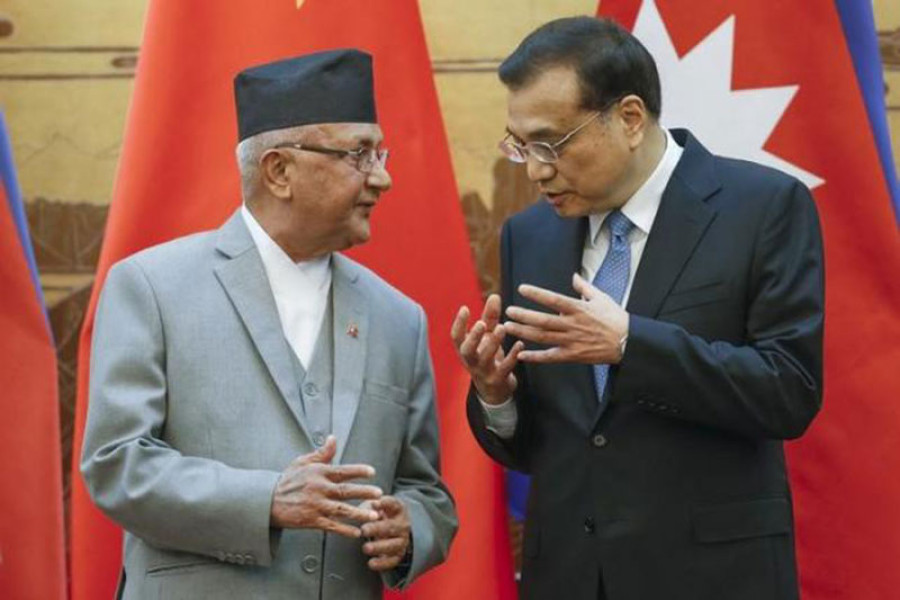Miscellaneous
Nepal hopes to boost China ties
Nepal will hope to cement its bilateral relations and work on furthering socio-economic ties with China as Prime Minister KP Sharma Oli embarks on a state visit on Tuesday.
Sanjeev Giri
Nepal will hope to cement its bilateral relations and work on furthering socio-economic ties with China as Prime Minister KP Sharma Oli embarks on a state visit on Tuesday.
Chinese experts opine the visit is of ‘greater significance’ to both the countries. They say PM Oli is visiting China as a leader of Nepal’s strongest government post 1990s with comprehensive peoples’ mandate.
During his previous visit to China as prime minister, Oli had signed 10-point agreement, including a landmark deal on transit trade aiming to reduce Nepal’s significant dependence on India. If implemented, the transit agreement would give Nepal access to sea routes via the Chinese port of Tianjin.
This time, apart from discussing the Protocol to the Transit and Transport Agreement, several other pacts and memoranda of understanding on connectivity, linking China and Kathmandu via rail, energy, tourism, opening more border points with China and construction of petroleum storage facilities, among others, are expected to be signed.
The recent unification of PM Oli-led CPN-UML and CPN (Maoist Centre) parties boosts his morale. This would reflect in his talks and meetings in Beijing, experts say.
China Institutes of Contemporary International Relations’ Institute of South Asian and Oceanian Studies Director Professor Hu Shisheng told Post, “China and Nepal both have higher expectations from this visit. Nepal’s practice of multiparty democratic system post-1990 proves it is not possible to achieve socio-economic development without political stability.
“Nepal now has the strongest government in its modern history. Therefore, it is optimistic to believe this government would focus on scaling up its past agreements.”
Chinese academia says political stability is the key to their own economic development, and is upbeat about the recent political developments in Nepal. They point to the formation of NCP that consolidated leftist forces in the country. This has increased China’s optimism and, consequently, it has significantly increased its engagement with Nepal in recently.
According to Hu, China currently is paying attention to two things: First, unity within the leftist party and second, Indian sensitivities in Nepal.
“China would like to encourage trilateral co-operation between the three nations. Therefore, these two factors would be the biggest concerns while formulating Nepal policy,” Hu said.
China’s optimism over political stability is not just related to Nepal’s internal situation, but is equally important for its ambitious Belt & Road initiative (BRI).
Sichuan University’s Institute of South Asian Studies Executive Director Professor Li Tao said, “A stable, open and developing neighbour would be conducive to promote China’s BRI, and for the stability and development of the western frontier of China.”
China hopes the Oli government would strengthen infrastructure construction in Nepal, and vigorously promote Nepal’s economic development and strengthen co-operation between Nepal and China so that Nepal would become an important transit country in the BRI framework, the professor said.
Stating that ‘Equality and mutual benefit’ is China’s most important interests in Nepal, Li opines Nepal opening to the world and attracting foreign investment are an important parts of its economic development. This way the Oli government would not only protect China’s interests, but also protect interests of other countries’ in Nepal.
“China’s ‘westward policy’ to enter the South Asia and India’s ‘act east policy’ to enter Southeast Asia are out of their own need for development. All sides would have their advantages and disadvantages. It is not necessary to make too much political interpretation,” she said.
PM Oli has earned ‘good reputation’ in China for agreements that have longer-term impact during his maiden stint as the Prime Minister.
Xu Liang a scholar, who writes articles on Nepal and India in the state-owned Global Times, and is a fellow at the Institute for higher research on Regional and Global Governance, Beijing Foreign University opined that the bilateral relations between China and Nepal are expected to progress by leaps and bounds during PM Oli’s tenure. “PM Oli should revisit previous agreements afresh. Many scholars in China believe PM Oli is a messenger of friendship between the two nations and that Nepal’s recent policy approach towards China is correct,” Xu said.
All Chinese experts have a common opinion that, not just the bilateral relationship between Nepal and China, but also a trilateral relationship that includes India should get an impetus under the current political regime.
“China-Nepal-India has golden opportunity to carry forward co-operation as these three nations have the strongest federal governments in past three decades. It would be blessings for citizens of these countries, especially for those living in the Himalayan region, if we succeed in working together to turn the Himalayan range to Development Bridge from natural barrier,” Hu said.




 9.89°C Kathmandu
9.89°C Kathmandu










